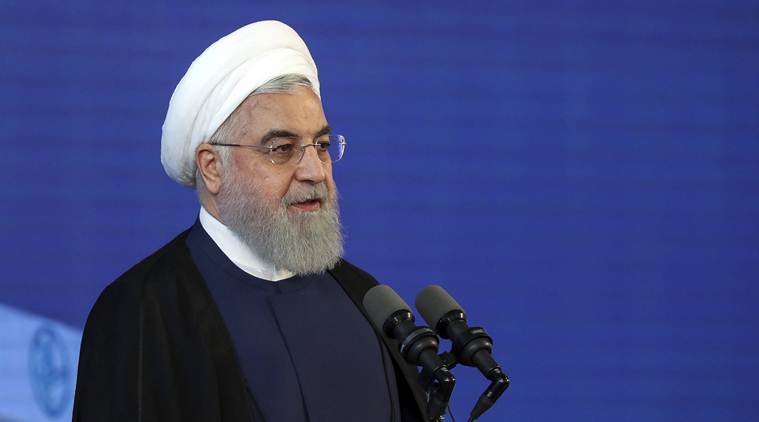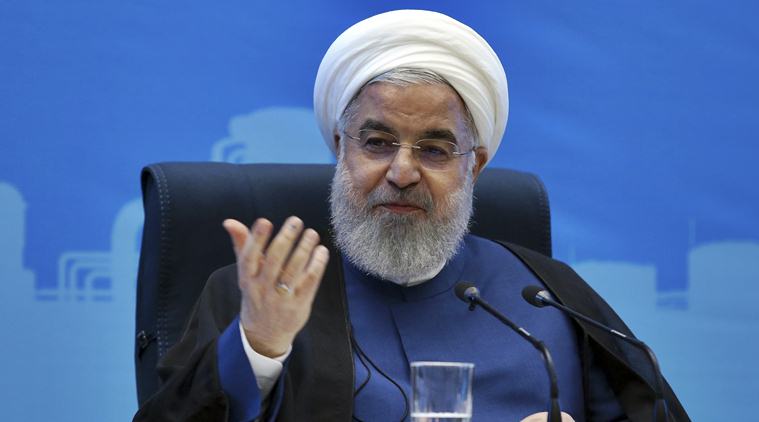- India
- International
Hassan Rouhani says Iran ready to talk to US if sanctions lifted
US President Donald Trump's administration says it is open to negotiations with Iran on a more far-reaching agreement on nuclear and security issues.
 In this photo released by an official website of the office of the Iranian Presidency, Iranian President Hassan Rouhani speaks in a ceremony at Imam Khomeini International Airport some 25 miles (40 kilometers) south of the capital Tehran, Iran, Tuesday, June 18, 2019.
In this photo released by an official website of the office of the Iranian Presidency, Iranian President Hassan Rouhani speaks in a ceremony at Imam Khomeini International Airport some 25 miles (40 kilometers) south of the capital Tehran, Iran, Tuesday, June 18, 2019.
Iran is ready to hold talks with the United States if Washington lifts sanctions and returns to the 2015 nuclear deal it quit last year, Iranian President Hassan Rouhani said in a televised speech on Sunday.
US President Donald Trump’s administration says it is open to negotiations with Iran on a more far-reaching agreement on nuclear and security issues.
But Iran has made any talks conditional on first being able to export as much oil as it did before the United States withdrew from the nuclear pact with world powers in May 2018.
“We have always believed in talks … if they lift sanctions, end the imposed economic pressure and return to the deal, we are ready to hold talks with America today, right now and anywhere,” Rouhani said in his Sunday speech.
Confrontations between Washington and Tehran have escalated, culminating in an aborted plan for US air strikes on Iran last month after Tehran downed a US drone. Trump called off the retaliatory US air strike at the last minute.

Calling for dialogue among all to resume, France, Britain and Germany – parties to the 2015 pact – said on Sunday they were preoccupied by the escalation of tensions in the Gulf region and the risk the nuclear deal might fall apart.
 In this photo released by the official website of the office of the Iranian Presidency, President Hassan Rouhani speaks in a meeting during his provincial tour to the North Khorasan, Iran, Sunday, July 14, 2019. (Iranian Presidency Office via AP)
In this photo released by the official website of the office of the Iranian Presidency, President Hassan Rouhani speaks in a meeting during his provincial tour to the North Khorasan, Iran, Sunday, July 14, 2019. (Iranian Presidency Office via AP)
“We believe that the time has come to act responsibly and to look for ways to stop the escalation of tension and resume dialogue,” they said in a joint statement that was released by the French president’s office.
Despite calling for talks with Iranian leaders, Trump said on Wednesday that US sanctions on Iran would soon be increased “substantially”.
Existing US sanctions have targeted Iran’s main foreign revenue stream from crude oil exports, which Trump in May moved to try to eliminate entirely.
READ | US will not blacklist Iran’s foreign minister, for now
In reaction, Tehran said it would scale back its commitments under the deal, under which it had agreed to curb its nuclear program in return for relief from US and other economic sanctions that had crippled its economy.
‘CONSIDER POSSIBLE CONSEQUENCES’
Defying a warning by the European parties to the pact to continue its full compliance, Tehran has amassed more low-enriched uranium than permitted and has started to enrich uranium above the 3.67% permitted by the agreement.
“The risks are such that it is necessary for all stakeholders to pause, and consider the possible consequences of their actions,” France, Britain and Germany, which have been trying to salvage the pact by shielding Tehran’s economy from sanctions, said in their statement.
Iranian clerical rulers have said that Tehran will further decrease its commitments if Europeans fail to fulfil their promises to guarantee Iran’s interests under the deal.
The nuclear deal aimed to extend the amount of time it would theoretically take Iran to produce enough fissile material for an atomic bomb – so-called breakout time – from several months to a minimum of one year until 2025.
Iran denies ever having considered developing atomic weapons.
There have been two signs in the past week that the United States may be signaling greater openness to diplomacy.
US officials told Reuters on Thursday that Washington had decided for now not to sanction Iranian Foreign Minister Mohammad Javad Zarif despite Treasury Secretary Steven Mnuchin’s June 24 statement he would be blacklisted that week.
On Sunday, US officials said they had given Zarif a US visa to attend a U.N. meeting this week. Iran’s mission to the United Nations said he had arrived in New York.
The State Department did not respond to a request for comment on why Zarif had not been blacklisted, why he had been granted a visa and whether US officials might use his New York visit to have direct or indirect contacts.
Apr 19: Latest News
- 01
- 02
- 03
- 04
- 05





























